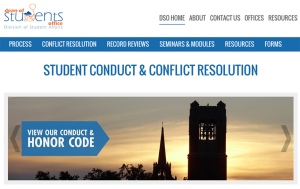by Julie Dodd
The last assignment for Mass Communication Teaching (MMC 6930) is to develop an online teaching portfolio.
Most of the students in the course typically are at least a year away from being on the job market, but the process of preparing job application materials helps them be more prepared to enter the job market — both by having materials developed and by realizing now what they should be working on to be more competitive when they do apply for faculty jobs.
Dr. Karen Kelsky has a helpful website with faculty job advice — “The Quick and Relatively Painless Guide to Your Academic Job Search” (2014)
Here are five tips for finalizing your job application materials:
Tip #1 – Embed your name on your documents – Any documents posted online, such as your PPT slides or syllabus, should include your name as a header/footer. That’s not a requirement for our assignment but advice for “best practices.” That helps you get credit for your work when it may be used by others – such as someone who might use your PPT slides in their own teaching.
Tip #2 – Name your digital files – In naming files, include your name and use all lower case and no spaces.
NO: Teaching Philosophy.pdf
YES: garcia_teaching_philosophy.pdf
Tip #3 – Be consistent with font and type size – When preparing documents, we sometimes copy/paste materials from different files. But you don’t want your final document to look like it was copy/pasted. So when you’ve completed the document, select all and then set the font and point size.
Tip #4 – Carefully proofread your work – Be sure to proofread your work. The impact of a well-written cover letter or vitae is diminished by grammatical or spelling errors. Read your writing aloud. Have a trusted colleague or friend read your work.
Tip #5 – Test digital files and links – Be sure you have tested links in digital files and have made sure your digital files open. (If you are creating your vitae in InDesign, for example, you should save the file as a PDF to make it easier for those receiving the file to open it.)


